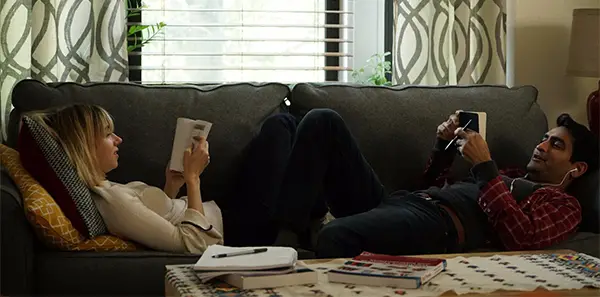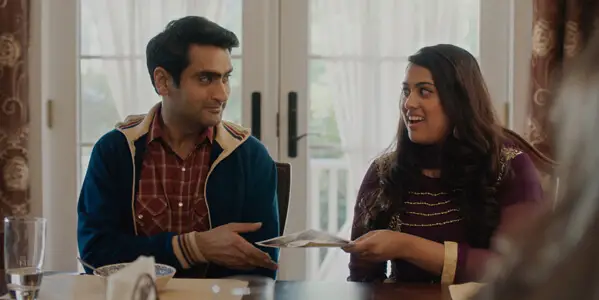THE BIG SICK: Your New Favorite Rom-Com

Akemi is a recent graduate of NYU's Tisch School of…
Boy meets girl at a comedy club in Chicago. Boy is a Pakistani immigrant, Kumail (Kumail Nanjiani), and Girl is a psychology grad student, Emily (Zoe Kazan). The Big Sick is based on the relationship between the real life Kumail Nanjiani and Emily V. Gordon.
The two are a force of clever comedy and honest vulnerability, sharing their relationship for all that it’s worth and taking on the responsibility to accurately portray a Pakistani family in America and the struggles they face. With the help of Judd Apatow, The Big Sick comes together as much more than your typical romantic comedy, setting a precedent for the genre.
Kumail and Emily 2.0
A friendly heckle leads to a night on a blow-up mattress ignoring Night of the Living Dead on the TV. The two agree to never see each other again, an agreement neither of them uphold, captivated by their natural chemistry. Meanwhile, Kumail attempts to continue to practice his Muslim faith to please his parents. Along with pretending to pray, he meets dozens of Pakistani women that his parents have chosen for him to marry.

Outside of his family life, everything seems to be going well for Kumail. He is a finalist in the auditions for the Montreal Comedy Festival and his relationship with Emily continues to flourish. Seeing the next step in their relationship is to meet one another’s family, she talks about her parents in hopes to meet his. Kumail continually puts it off until one day she finds his stash of pictures and information cards of the Pakistani women he’s been meeting. Hurt that he hasn’t told his family about her, and feeling guilt that their relationship could cause him to be disowned by his family, they break up. But before either of them can move on, Emily contracts a disease that attacks her body so quickly, she is put into a coma. Kumail realizes his love for Emily and waits for her to recover along with her tumultuous parents.
Yes, It’s a Rom-Com
Yes, they have a meet cute and their one-night stand blooms into more. Yes, as they fall in love, their dynamic will make you say, “aww.” And yes, it seems that Emily almost dying seems like an emotional tactic to show the true love that Kumail has for Emily. Yet, it doesn’t feel that way. Even when Emily emerges from her coma and sees Kumail’s dedication to her, she still doesn’t take him back. You feel for Kumail’s pain but understand Emily’s reasons. Their ups and downs aren’t pandering to your emotions because both of them open themselves up in ways that welcome you to invest in them and put yourself in their story.
Though the gold of the film is the touching story of Kumail and Emily, what elevates it to greatness is the comedy. They take advantage of Kumail being a stand-up comedian, with some jokes coming from the stand-up sets by Kumail, CJ (Bo Burnham) and Mary (Aidy Bryant). There is also the use of awkward moments in a blossoming relationship, sharing your favorite things with each other, and breaking boundaries. But the best laughs come from helpless characters like Chris (Kurt Braunohler) and Terry (Ray Romano). They aren’t jokes for the sake of jokes—they are thoughtful and emerge organically, brought out by great writing and fantastic actors.
But, It’s a Really Good One
What separates this film from other romantic comedies is that it is completely and totally believable. Maybe, because it’s based on the life of the writer, that gave it a natural authenticity, but it is also showcases careful and smart choices of where and when to implement drama. Since we know that Emily does make it out of the coma, there isn’t a reliance on putting suspense whether she would live. Rather, it is manifested naturally in the tension that is present between other characters.

The only clear setup in the film lies in the relationship of Emily’s parents. They parallel Kumail and Emily’s relationship by struggling with an underlying issue that keeps them from a perfect relationship. Terry and Beth (Holly Hunter) are constantly bickering; it’s quick and goes without sounding any alarms at first. The agony of waiting for Emily to wake up grows and their tension heightens until they bring up what has been keeping them apart. They spend time away from each other, which allows Terry to bond with Kumail and help him navigate his feelings for Emily. Though in this sense, it’s apparent that Beth and Terry’s fight serves the plot, in the movie it unfolds naturally and gives you the sense of dramatic satisfaction that we crave as audience members.
Actually, It’s So Much More Than a Rom-Com
With Emily in a coma for most of the film, there is little deviation from Kumail’s perspective. But rather than it indicating an obvious flunking of the Bechtel test, it serves a greater purpose. He breaks the stereotype of Asian men, presenting himself as a charismatic and confident guy with a little bit of a dorky side. He fulfills the common persona of a male rom-com lead, but instead of being harassed in a bar for being a dork, he endures racist heckling from his audience during a set. It is a subtle but effective way of showing how his life as an American is briefly interrupted by moments of conflict. It opens up the audience to confront the racial tension in America without deviating away from the actual story.

Similarly, through Kumail we enter a world that is never seen onscreen: an accurate representation of a Pakistani immigrant family in America. Against Hollywood’s common assumption, we find that an immigrant family isn’t much different than American-born families. They have dinner together, siblings tease, parents push them to fulfill their potential. What might be different? Kumail is told to go pray when he comes to visit his parents and in the middle of their meal, or a young Pakistani girl will come interview to be Kumail’s wife. Though a majority of audiences don’t experience what Kumail does, the relationship he has with his parents is universal.
Conclusion
It’s possible that I loved this movie so much because I truly adore Kumail and Emily as people, but I fully believe that this is a genuinely great movie. Kazan has always been a great actress and we are forever grateful for Nanjiani to relive this time for us onscreen. I left the movie with black streaks down my face and an overwhelming desire to watch it again. I could talk about this movie and their story for hours, but I’ll leave it at this: please go see The Big Sick.
The Big Sick opens in select theaters June 23rd and wide release July 14th (Emily and Kumail’s anniversary… AWWWWW!) For international release dates, click here.
Does content like this matter to you?
Become a Member and support film journalism. Unlock access to all of Film Inquiry`s great articles. Join a community of like-minded readers who are passionate about cinema - get access to our private members Network, give back to independent filmmakers, and more.
Akemi is a recent graduate of NYU's Tisch School of the Arts and still cannot write a proper biography. She has a B.A. in Cinema Studies with a minor in Producing and has no idea what she is going to do with that. She loves comedy in all of its forms and wants desperately to be a stand-up comedian but has stage fright and all of her writing is incredibly sad. She hopes to one day to be a film professor because trapping a bunch of people to listen to her talk about movies all day would be a dream come true.












